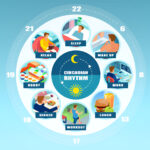Mindful eating helps you transform your weight loss journey because it makes you focus fully on your meals. When you notice your hunger and eat more slowly you make healthier dietary decisions while controlling portion sizes.
Learning to savor food while paying attention to your body lets you lose weight better and build healthful eating habits for lasting success in your wellness path.

1. Stop Your Non-Thinkers’ Snacking Habit
Spot Your Uncontrollable Eating Habit
Mindful Eating to Lose Weight Eating without thinking gets into your daily schedule and disrupts your wellness plans before you see it happening. When you eat without attention to hunger or emotional stress, you practice this unthinking snacking behavior.
Your non-thinker’s snacking habit builds silently through automatic behavior when you eat while watching TV or look at the fridge during stressful moments. You must pay close attention to your thoughts and actions to end your mindless eating behavior.
Study Your Emotional Responses First
Emotional eating drives the habit of mindlessly eating. People reach for food to control their stress levels and feelings of depression, plus solve personal downtime. When you face a tough day, you often grab comfort food like chocolate or chips to boost your mood with feel-good chemicals.
Mindlessly eating imparts feelings of guilt that damage your well-being further. Understanding which emotions trigger your eating routines helps you move towards change.
Spot Environmental Cues
The places around you make it harder for non-thinkers to resist food cravings. Foods that are easy to see around you, like the snack jar on your desk or the snacks on the coffee table, will encourage you to eat even though you do not feel hungry.
Your mind pushes you to want food when it sees edible items before you. Taking control of your non-thinker habit demands replacing visible food triggers with healthy choices.
Break Habitual Patterns
Your regular eating routines gradually become embedded in your mind. Our daily habits trigger us to eat while watching TV or performing work tasks. Over time, these behaviors form a pattern.
You must perform new habits regularly to stop this pattern. Determine what causes your unhealthy food habits, then switch to good nutrition to improve your eating practices.
Decode Hunger Confusion
Hunger confusion makes people eat without thinking. When your body feels dry, it sends hunger signals to your mind even though it genuinely needs water to rehydrate. Drink water before you snack to see if water alone reduces your hunger.
When you learn to identify accurate thirst signals, your non-thinkers will eat less because they will stop reaching for mindless snacks.
Practice Mindful Eating
Paying full attention to your eating helps fight non-thinkers unhealthy snacking practices. Fully notice and appreciate your food through all its tastes, textures, and smells as you eat. Before grabbing a snack, take a moment to test whether you want to eat because you are hungry.
By eating mindfully, you learn to control your habits and naturally stop your non-thinker habit of unhealthy snacking.
Create Regular Meal Times That Follow a Plan
When you eat at regular times, you help your body receive necessary nutrients that discourage mindless eating. Your brain encourages snack cravings when you skip meals or unknowingly eat unbalanced nutrition.
Planning protein rich meals that combine fiber and healthy fats will help you feel full and quit your unhealthy snack habit. Planning your meals correctly brings impressive results.
Tidy Up Your Environment
You must change how things look in your space to end your unintentional snacking pattern. Store unhealthy food out of sight on inaccessible kitchen surfaces and workspace areas.
Fill your kitchen with healthy snacks that include fresh produce and nuts. Putting tempting foods away and placing healthy choices where you can reach them makes breaking your non-thinker habit much more manageable.

Address Emotional Eating
To break your non-thinkers’ eating pattern, you need to deal with why you choose to eat emotionally. When uncomfortable emotions hit, focus on activities like writing in a journal, meditating, and exploring the outdoors rather than turning to snacks; finding new ways to handle emotional challenges will help you need food less to feel better.
Keep your body well-hydrated all day
When you drink enough water, you know your real hunger signals better than the appetite signals sent by dehydration. Sipping from your water bottle throughout the day will help you stay hydrated and reduce food cravings.
Water, including herbal tea or sparkling options, can refresh your system as a wholesome alternative. Hydrating your body daily helps you eat when needed and avoid unnecessary food for your non-thinker’s snacking problem.
Keep A Food Journal
Recording food intake and emotions can help you identify why your non-thinkers keep eating. When you face stressful talk or feel unoccupied, your body tells you to reach for sweet treats. Tracking how and when your non-thinkers eat helps you create specific antidotes for the present and future.
Plan For Success
Advanced planning sets you up for mindful eating. Setting out single-serving snacks or making meals ahead lets you reach for good food before you eat something unhealthy.
Take a small bag of nuts or granola bar with you to prevent hunger pangs at work. Planning your meals well creates a solid method to overcome your food habits and reach your wellness targets.
Celebrate Small Wins
Development toward healthy eating takes extended time, so celebrate your achievements during each phase. Your motivation to stay motivated grows stronger as you handle problems and reach your transformation goals.
The more you succeed in your transformation journey, the stronger your motivation will become to fight cravings.
Enjoy Mindful Eating Rewards
When you learn to manage how you eat snacks, you gain advantages beyond weight control. By preventing your non-thinkers from snacking, you increase your natural energy, develop better food habits, and become more mentally focused.
Focused eating helps both your physical health and your emotional satisfaction. Living well with these benefits makes the hard work worth it.
Transform Your Eating Habits
You don’t need to ban all snacks to help your non-thinkers stop their unhealthy eating patterns. To develop successful eating habits, select food consciously during each meal.
When you understand your most vulnerable moments, you can change your environment and practice mindfulness to stop mindless eating. The change helps you create good eating practices and a better connection with your food.
2. Breaking Free from Difficulties With Emotional Binge Eating
You Can Overcome Your Difficulties with Food for Emotional Comfort
When you feel emotions, feelings trigger emotional eating because your spirits need food to escape destructive emotions such as anxiety and loneliness. Feeding impulses helps you avoid emotional challenges, but this temporary distraction often leads to more problems than it solves.
These brief moments of food comfort harm your mental health and create self-destructive cycles. Watching when emotional eating occurs helps you start the change by learning your eating routines.

The Role of Mindfulness
Mindfulness helps people control their emotional eating habits effectively. When you pay attention to what you feel in the moment, you can better recognize signs that you’re physically hungry and emotionally unrested.
Taking care when you eat to reach your weight loss goals means you win both physical results and a better food connection. Being mindful when you eat helps you recognize your food sensations and prevents sudden emotional eating reactions.
You need to find what causes eating emotionally
Your first step must be determining what emotional factors cause this eating response. The pressures of working all day and facing isolation at weekends or special occasions often push people to turn to food.
You transform to food during either tense disagreements or anxious situations. Detecting these patterns starts your journey toward mindful eating, which helps you lose weight and overcome emotional hunger. Knowing yourself better leads you to make better nutrition choices.
Overcoming Our Natural Eating Routines
Eating without thinking becomes automatic during feeling shifts. As our responses to particular circumstances become habitual, they develop automated emotional connections.
Our habit of reaching for ice cream whenever we have a terrible day will soon become ordinary. When you focus on your eating habits, you can consciously decide whether to eat food.
Tuning Into True Hunger
When you want to stop emotional binge eating, you first need to learn to tell when food cravings stem from hunger or emotional needs.
When we use food for emotional reasons, we do it because we want to feel better inside rather than because we need to eat. You can learn to detect your body’s hunger cues through mindful eating and eating only at proper feeding times.
Changing Our Responses to Emotions
Rather than using food to deal with your emotions, try effective alternatives to self-soothe. Paying attention to your thoughts through journaling, meditation, or walking helps you understand your feelings.
These techniques work together to control emotional stress while helping you lose weight through mindful eating habits. Using different coping skills strengthens us emotionally and leads us toward permanent changes.
Your Behavior Toward Food Changes
Food creates a complex emotional bond with many individuals. People often view food as a way to celebrate or discipline themselves or a source of friendship.
When you practice mindful eating habits to manage weight loss, you completely shift how you view food as a source of energy for your body and mind. By taking your time to eat and paying attention to food flavors, you change harmful eating patterns and learn to understand food as nourishment.
You Need to Maintain Proper Food Choices
Stable, nutritious diets help you maintain good physical and emotional health. When you eat poorly, you develop stronger emotional hunger and experience excessive eating periods.
When you try to lose weight through mindful eating, you need to eat balanced meals with protein, fiber, and fat nutrition. When your meals provide the nutrition your body needs, it lowers the urge to eat because of strong feelings.
Building a Perfect Space for Food Consumption
Where you live or work affects how often you eat food. Unhealthy snacks that quickly grab your attention trigger emotional eating without thinking. When you create a space that follows mindful eating standards, your weight loss goals will get better results.
Keep healthy foods in easy reach and make fresh produce easy to access. Also, normalize foods with high calories to control your cravings.
Being Present During Each Meal Can Assist In Weight Loss Transformation
Eating mindlessly while using your phone or watching TV creates conditions for binge-watching these episodes. Focusing on your food during each meal is integral to becoming mindful when losing weight.
When you focus entirely on your food, you will notice a better feeling of satiety. Consuming meals this way develops tremendous meal respect while stopping emotional eating behaviors.
Learning to React Well to Mistakes
People need patient effort to recover from emotional binge eating and learn from food relapses. Instead of self-criticizing, you should learn from every setback. Showing yourself compassion helps you sustain weight loss achievements over time.
Making weight loss choices mindfully matches this supportive method since you develop lasting habits without feeling guilty.
You Can Learn How to Deal with Triggers That Cause Stressful Eating
Stress is the most common emotional eating trigger that pushes us to consume food in large amounts. When stressful times hit, food consumption seems natural to many people.
To prevent weight gain, you should perform relaxation exercises like deep breathing or mindfulness training before you eat. Using these methods decreases your need for food to handle problems.

Building Consistent Meal Times
Our emotional cravings get worse when we skip meals and do not follow a regular eating schedule. Regular eating schedules maintain steady blood sugar levels and control mood and energy swings.
Your meal routine with mindful eating practice helps you resist emotional eating and prevent overeating sessions when you try to lose weight.
Journaling Emotional Eating Patterns
Authorizing food emotions through journaling blogs helps you better understand your eating habits. Recording your food and emotions during the day shows you when and why you binge eat.
Your emotional insights help you develop mindful eating habits that allow you to understand and improve your weight loss journey.
Setting Realistic Goals
Don’t expect to solve emotional binge eating immediately because you’re setting unachievable standards. Gradual progress is more sustainable.
The weight loss process through mindfulness involves setting and measuring small eating changes, such as eating without distractions and recognizing target triggers. Small daily goal achievements help create a succession of permanent eating modifications.
The Emotional Impact of Food
Your relationship with food is tied to emotional elements, and you will naturally face good and bad eating days. When emotional eating interferes with your wellness plans or stops you from living your everyday life, it becomes a problem.
When you practice mindful eating for weight loss goals, you can regain emotional control over food and transform your relationship with nutrition.
Achieving Freedom Through Mindfulness
Losing weight through mindful eating goes beyond binge eating control to help you permanently escape emotional food battles. Your body shows clear signals about what you need.
By focusing on safe stress outlets and staying balanced, you can achieve better health emotionally and physically. Your new mindset will help you escape emotional eating and start your journey toward healthier living.
3. Stop eating while watching screens
More people now eat while using screens
Many people now feel natural about eating meals with screens around them. You turn meals into background tasks, no matter if you watch entertainment or work on electronic devices.
Eating while distracted by devices prevents you from understanding your actual food consumption. To achieve weight loss through mindful eating, you must eliminate this habit.
Ignoring distractions strengthens meal awareness
When you use screens during meals, you lose focus on what you eat and tend to take more bites than necessary. When you focus on your screen, you lose connection with how your food tastes and feels. Eating without attention usually takes too many bites, adding to excess pounds over time. Remove all distractions from your meals to begin mindful eating for weight loss.

Mindless habits dull your awareness of eating
If you eat while other distractions occur, you may fail to notice when you feel full or hungry. Without mindfulness, you may eat too much food and feel empty despite eating enough. However, you can return to balanced habits when you practice eating to lose pounds.
Your food relationship begins with mindful eating
Your food deserves your complete attention while you eat. You learn the essence of each bite by focusing carefully on how it looks and feels while you taste it. When you stop using screens at meal times, you give yourself room to appreciate your meal better. By paying attention to your appetite, you develop dietary practices that help you maintain weight and enhance your health.
Digital devices make you eat more than intended
You don’t realize when screens cause you to eat more portions. Research shows that people eat more when they do not focus on what they eat. Because of this habit, you lose power over how much you eat. Choose places that support your full attention to meals to lose weight with mindful eating.
Distracted emotional eating perpetuates overeating issues
Using phones or computers when you eat emotionally based food habits makes the problem more severe. When facing stress, you want to eat snacks while watching shows or checking your phone.
The habit connects your emotional responses with screen time and poor diet choices. To achieve weight loss through mindful eating, you need to stop emotional eating by avoiding meals during screen use.
You will develop deliberate practices.
You begin breaking this digital eating habit by implementing simple, planned actions. Design an electronic free zone where you can eat your meals. Choose to sit at a proper dining table when you eat rather than eating on a couch or desk space.
You begin moving toward mindful eating when you lose weight through deliberate self-control of your eating habits.
Understanding your body’s hunger cues helps you eat better
When you split your focus between screens and meals, you stop sensing when you need to eat and when you are full. Through mindful eating, you stop evaluating whether your hunger is actual or just routine behavior. Listening to your body helps you eat properly and assists your weight reduction approach.
The Role of Visual Cues
The presence of screens stops you from enjoying your food’s visual features and eating experience. How you feel about your meal depends on seeing your food’s design and colors. Eating requires your full visual attention to make mindful eating for weight loss effective.
The Joy of Slowing Down
When you eat without screen distractions, you give yourself time to enjoy your meal fully. When screens distract you at mealtime, you stop being present with your food. Your food leads to better digestion, and eating slowly strengthens your enjoyment of mindful eating as a weight loss method.
Snacking Gets a Makeover
When you use screens, you usually snack, too, but you focus on eating the wrong food. You make better food choices when you eat mindfully instead of snacking without thinking. Listening to your body’s hunger signals before choosing snacks will help you achieve weight loss results more quickly.
Enjoy family meals without technology
You can build stronger connections through the food you eat together. When you avoid placing screens on the dinner table, you create space to talk and enjoy your meal better. Family meals help us eat mindfully while losing weight through shared eating habits.

The Long-Term Benefits
Choosing to eat without digital distractions brings positive results that last. Making screen-free meals lets you better understand your physical needs while teaching you to eat consciously instead of automatically. As you maintain these new habits, you will achieve permanent weight reduction plus better mental and physical health.
Create a Screen-Free Routine
The process of stopping eating with screens takes time but produces good results. Make your first screen-free meal each day, then add more meals to your plan until every meal happens without any devices present. Eating without distractions helps you lose weight by letting you focus on your food choices as part of mindful eating habits.
A Step Toward Mindfulness
Stopping screen use during meals helps you become more aware of your everyday activities. You become more attentive to your food consumption and every habit you follow through this habit. When you practice mindful eating to reduce weight, you build a better relationship with food, which helps improve your overall health.
Inspire Change Within Yourself
When you avoid screen time during meals, new habits will develop. When you eat mindfully, you create better self-control and become more balanced and self-aware. The process helps you lose weight while teaching you to live healthier lives with more precise focus.
Enjoy Food, Screen-Free
Moving to screen-free meals helps you understand that meals provide nourishment, enjoyment, and protection for your body beyond helping you lose weight. When you eat your meals mindfully, your meals become healthier and bring you more happiness. Linking mindful eating habits with this mindset will help you create sustainable positive changes in your life.
4. Getting Rid of the Habit to Eat When Bored
Understanding how emotions trigger unexpected eating is crucial
Boredom drives us to use food as an emotional solution instead of facing emptiness. When you have unwanted time on your hands, food seems like an effortless way to pass the time. Your brain signals you to eat to relieve emotional stress, not because you need food.
Over time, your brain develops an unhealthy habit by associating boredom with food consumption. You can start progressing by understanding that your eating habits come from emotional needs, not hunger.
The Power of Awareness
Too many people don’t recognize that they eat this way bored, making emotional eating common. You automatically grab food because your mindless routines let you eat without analyzing your actions. You start mindlessly eating while looking at your smartphone or television.
Without mindful eating, you won’t notice what leads to this habit. The sooner you spot your emotional eating pattern, the quicker you can avoid developing automatic food-seeking habits.

Food as a Temporary Fix
Eating when bored helps you feel better quickly. Your brain’s reward system lights up from fatty and sweet foods, giving you fast but brief mood improvements. The emotional relief you find through food quickly fades and doesn’t fulfill your hunger.
Snacking during downtime does not fix the real reasons you feel empty and turn to food. Overeating leads to feelings of guilt, which deepens your habit of emotional eating.
The Role of Distractions
Your emotional eating habit grows stronger when you eat while paying attention to phones, TVs, and computers. People now spend their meals looking at screens, breaking their connection to their food.
When you get distracted, your mind loses focus on monitoring food intake and recognizing fullness while eating. Digital habits guide your eating rather than natural hunger signals, so you eat beyond your body’s needs. You must separate your mealtime from screen time to achieve better eating habits.
Spotting when boredom triggers eating is key to better habits
People tend to eat from boredom in set situations and particular daily moments. This behavior occurs most often during your evening unwind time or through breaks at work. Knowing when you eat due to emotions helps you plan actions to break this habit.
Knowing your trigger points lets you develop better ways to handle idle time before eating. You will feel more in charge of your actions once you know how situations or feelings trigger you.
Shifting Your Focus
A successful method to stop emotional eating is to change your attention to other things. When boredom strikes, find a new activity instead of seeking comfort food. You can break your food cravings by doing activities such as reading a book, walking, or chatting with a friend.
Your main target should be actively dealing with your boredom, not suppressing it with food. Finding different things to do creates opportunities for you to learn new interests.
Practicing Mindful Eating
Mindful awareness helps you break the habit of emotional eating. Put all your senses to work while you eat. Take time to feel the surface quality of your food and experience its taste and aroma.
Take your time eating while watching how hungry you really are. By paying attention, you strengthen your food connection and learn to tell emotional eating habits apart from actual hunger. Regular mindful eating practice reduces your urge to eat for emotional relief.
Building Healthier Habits
Developing fresh daily habits will help you stop using food to deal with emotions. For example, pick herbal tea or gum as your new habit instead of snacking when you watch television.
Making healthy choices instead of your usual snacks teaches your brain to avoid eating because of emotions. Regular changes in your daily habits will help reshape how you deal with boredom, and feeling accomplished will make you less likely to eat for emotional relief.

The Emotional Connection
Your habit of emotional eating when bored may reveal hidden emotional problems. You may turn to food as your primary coping mechanism to handle your life’s difficult moments. Studying your feelings towards food helps reveal emotional issues that demand resolution.
Writing in a journal or speaking with someone skilled in listening enables you to process emotions without using food to distract yourself.
Long-Term Benefits Ahead
You can achieve multiple lasting benefits when you stop using food to process your emotions. By following your body’s hunger signals, you naturally avoid overeating. You develop more confidence when you stop using food to comfort yourself emotionally.
Your body handles food better and supports weight control while you develop true enjoyment of proper meals. You will learn better responses to emotions and boredom that stop you from eating unnecessary food.
Making Peace with Food
To conquer boredom eating, you need to create a positive connection with food. Food exists to support your physical health and provide pleasant eating experiences without making you feel bad.
Through self-understanding and mindfulness, you can replace emotional eating habits with better habits. Through consistent steps, you will achieve a meaningful lifestyle that harmonizes your actions with your goals. Sing screens.

5. Breaking out of the harmful pattern of restricting food and then binge eating
You Need to Understand the Emotional Cycling Process
Many people enter a harmful emotional eating routine that starts with food limits. They want to regulate their eating habits by reducing portions or missing meals. Although they feel good afterward, these temporary measures create powerful cravings and emotional weakness.
The result? When intense hunger combines with emotional suffering, they overeat. Understanding food restriction patterns helps people start their transformation process.
People begin food restriction as a response to their emotional feelings about weight and eating
People restrict their food intake because they feel emotionally pressured by shame, guilt, and weight-control fears. When their intense emotions become too hard to handle, they respond by introducing intense diet restraints.
When people engage in emotional eating, they maintain this habit. Your mental stress increases when you set personal diet limits despite wanting emotional relief, and you then crave unhealthy food more. Knowing emotions affect your eating practices can help you handle nutrition better.
The Effects on Your Body
The behavior of eating more after staying on an eating plan too long badly damages your physical condition. Your body reacts strongly to being underfed and asks for high-calorie comfort food to ease your needs. Your emotional eating reaction turns food cravings into hunger, leading to eating more than you intended.
Constantly shifting your eating habits damages your body’s natural metabolic control, which then causes fatigue, energy imbalances, and gastrointestinal problems that make following a healthy diet harder than ever.
How Binging Begins
When people put limits on their food daily, they often binge-watch to discharge their feelings. The emotional eating habit grows stronger as you shift to eating food to make restraint-induced guilt or discomfort go away.
After starting a binge, the desire to control eating disappears, and you begin eating to manage emotions instead of hunger. When you ignore what triggers your emotional eating routine, you continue feeding this destructive habit until you cannot find a way out.
Coping with Guilt
Feeling bad about overeating makes the cycle continue after binging. Your perception of being out of control leads you back into food restriction patterns.
This eating pattern uses shame to create strong polarizing habits that block recovery. When you speak kindly to yourself about your situation, it helps you start making better decisions.
Identifying Our Emotional Triggers Is Important
Decoding your emotional stimulation leads to better results with food habits. Depression over emptiness and anxiety drive functioning from control during food limitation.
When you feel these emotions first, they may lead to binge eating. Identifying the triggers that lead you to this pattern allows you to stop it early and take better actions.
The Power of Mindfulness
Effective mindfulness practice improves your emotional relationship with food. When you take your time at meals, you can better sense when you need to eat and when you’ve had enough food.
When thoughts of bingeing come up, mindfulness teaches you to take deep breaths while examining what triggers your consuming habit. This habit teaches you to think differently about feeding yourself.
Finding Peace with Food
Creating peace with your emotional eating habits demands a new understanding of how you use food. Trying to label food as “bad” or “good” makes it harder to eat well because you can’t balance healthy choices with indulgences.
Your relationship with eating improves when you accept hunger cues while dropping negative self-punishment. Achieving harmony with food creates reliable peace of peace.

Creating Stable Patterns for Your Life
Your solution to emotional eating requires habits that help you maintain healthy nutrition and mental wellness. Eat set meals that contain protein, carbohydrates, and dietary fats.
Eating enough to supply your body’s energy needs reduces your chances of starting the cycle. When controlling emotions, combine food choices with activities like writing in a journal or speaking with buddies.
The Role of Self-Compassion
Treating yourself with kindness stops your emotional eating routine. Thinking poorly about ourselves leads us down a self-destructive cycle of food binges and rigid diets. Being kind to yourself helps break the adverse eating cycle patterns.
Understand that your emotional eating comes from habits you learned, not from your own mistakes. Starting new changes becomes easier when you approach them with compassion toward yourself.
Replacing Restriction with Trust
Changing from rigid diet rules to greater trust in our bodies will stop emotional eating patterns. Your body has an inner wisdom that tells you when it needs and wants certain foods so you can trust this natural system.
Exchange fixed dieting plans with an eating system that matches your hunger needs and satisfaction levels. By trusting your body, you create a strong foundation that turns eating into a healthy practice instead of an emotional struggle.
Reclaiming Emotional Balance
You must recover your emotional stability beyond essential nutrition to escape emotional eating habits. Meditation exercise or therapy builds your mental strength to manage your triggering emotions better.
Working through your emotional reasons for eating establishes better conditions for personal growth and self-healing. When emotional balance controls eating, you take food actions that feel peaceful and grounded.
Benefits of Breaking Free
When you stop eating emotionally, you unlock numerous positive life changes. Your connection to your body will strengthen as you gain control by deciding what to eat without negative emotions.
Your physical well-being should return to normal; food won’t hijack your focal point again. When you get past emotional eating, you can use your new freedom to live actively each moment without food controlling your decisions.
With dedication and attention, you can successfully eliminate emotional eating as your lifestyle. Taking action on physical and mental eating patterns allows you to achieve lasting positive results. When you move toward food balance, you also develop a healthier link with nutrition.
Mindful eating benefits
Mindful eating benefits include better digestion, portion control, and overall meal satisfaction. It emphasizes the present moment and listening to hunger and fullness cues, helping to mitigate overeating, creating a healthy relationship with food, and contributing to emotional well-being.
<script type="application/ld+json">
{
"@context": "https://schema.org",
"@type": "Article",
"mainEntityOfPage": {
"@type": "WebPage",
"@id": "https://skyhealthnews.com/mindful-eating-to-lose-weight/"
},
"headline": "Mindful Eating to Lose Weight",
"description": "Mindful eating helps you transform your weight loss journey because it makes you focus fully on your meals.",
"image": "https://skyhealthnews.com/wp-content/uploads/2025/01/mindful-eating-to-lose-weight-1024x683.jpg",
"author": {
"@type": "Person",
"name": "Farhad",
"url": "https://skyhealthnews.com/author/farhad"
},
"publisher": {
"@type": "Organization",
"name": "",
"logo": {
"@type": "ImageObject",
"url": ""
}
},
"datePublished": "2025-01-28"
}
</script>









